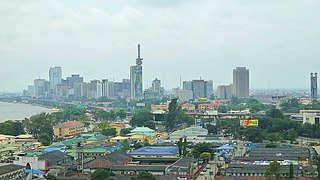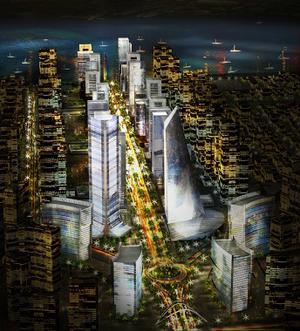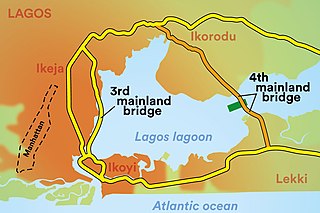Nigeria’s transport network has expanded in recent years to accommodate a growing population. The transport and storage sector was valued at N2.6trn ($6.9bn) in current basic prices in 2020, down from N3trn ($8bn) in 2019, according to the National Bureau of Statistics (NBS). This was reflected in a lower contribution to GDP, at 1.8% in the fourth quarter of 2020, down from 2.1% during the same period the previous year but higher than the 0.8% recorded in the third quarter of 2020. One of the most significant challenges facing the sector is meeting the needs of both large coastal cities and rural inland communities in order to fully unlock the country’s economic potential. This is especially the case with mining and agriculture, both of which are expected to benefit from two large-scale projects: the Lekki Port in Lagos and the Kano-Maradi rail line in the north of the country.

Lagos, or Lagos City, is a large metropolitan city in southwestern Nigeria. With an upper population estimate of 21 million, it is the largest city in Nigeria, and the most populous urban area on the African continent. Lagos was the national capital of Nigeria until the government's December 1991 decision to move their capital to Abuja in the centre of the country. Lagos is a major African financial centre and is the economic hub of Lagos State and Nigeria at large. The city has a significant influence on commerce, entertainment, technology, education, politics, tourism, art, and fashion in Africa. Lagos is also among the top ten of the world's fastest-growing cities and urban areas. A megacity, it has the fourth-highest GDP in Africa, and houses one of the largest and busiest seaports on the continent. Due to the large urban population and port traffic volumes, Lagos is classified as a Medium-Port Megacity.

Lagos State is a state in southwestern Nigeria. Of the 36 Nigerian states, it is the second most populous state but the smallest in area. Bounded to the south by the Bight of Benin and to the west by the international border with Benin for 10 km, Lagos State borders Ogun State to the north for about 283 km, making it the only Nigerian state to border only one other state. Named for the city of Lagos—the most populous city in Africa—the state was formed from the Western Region and the former Federal Capital Territory on 27 May 1967.

Lagos Island is the principal and central Local Government Area (LGA) in Lagos, Nigeria. It was the capital of Lagos State until 1957. It is part of the Lagos Division. As of the preliminary 2006 Nigerian census, the LGA had a population of 209,437 within an area of just 8.7 km2. The LGA only covers the western half of Lagos Island; the eastern half is simply referred to as Lagos Island East LCDA.

Third Mainland Bridge is the longest of three bridges connecting Lagos Island to the mainland, the others are the Eko and Carter bridges. It was the longest bridge in Africa until 1996 when the 6th October Bridge located in Cairo was completed. The bridge starts from Oworonshoki which is linked to the Apapa-Oshodi expressway and Lagos-Ibadan expressway, and ends at the Adeniji Adele Interchange on Lagos Island. There is also a link midway through the bridge that leads to Herbert Macaulay Way, Yaba. The bridge was built by Julius Berger Nigeria PLC. The phase one of the project was commissioned by President Shehu Shagari in 1980 and completed by President Ibrahim Babangida in 1990; it measures about 11.8 km in length.

Bridge Football Club is a Nigerian football club based in Lagos that was founded in the mid-1970s. As a result of its association with the Julius Berger construction company, the club was known as Julius Berger Football Club until 2010. The club has won national championships and competed internationally. Players such as Odion Ighalo, David Adekola, Yakubu, Taribo West, Sunday Oliseh, Samson Siasia, Emmanuel Amuneke, Rashidi Yekini, Garba Lawal, and Mutiu Adepoju have played for the club.
Julius Berger is a Nigerian construction company, headquartered in Abuja, with additional permanent locations in Lagos and Uyo.

Babatunde Raji FasholaSAN ; born 28 June 1963) is a Nigerian lawyer and politician who served as the federal minister of Works and Housing of Nigeria from 2019 to 2023. He previously served as the minister of Power, Works and Housing from 2015 to 2019. He also served two terms as governor of Lagos State from 29 May 2007 to 29 May 2015.

Carter Bridge built in 1901 is one of three bridges connecting Lagos Island to the mainland, the other are the Third Mainland and Eko bridges. At the time of its construction, this was the only bridge connection between the mainland and Lagos Island. The bridge starts from Iddo on the mainland and ends at Idumota area of Lagos Island.

Mobolaji Olufunso Johnson was a Nigerian Army Brigadier who served as Military Administrator of the Federal territory of Lagos from January 1966 to May 1967 during the military regime of General Aguyi-Ironsi, and then as the pioneer and first Governor of Lagos State from May 1967 to July 1975 during the military regime of General Yakubu Gowon. As Governor of Lagos, his administration supervised the unpopular demolition of the Ajele Cemetery in the early 1970s.

Adefemi Kila is a Nigerian politician and engineer who served in the Senate, representing Ekiti Central in April 2007 just after working for Julius Berger Nigerian Plc for 30 years as a civil engineer and as a technical manager (administration) for 18 years. He is currently a council member of Standards Organisation of Nigeria SON. He is a devoted Christian of the Anglican church of Nigeria.

Eko Atlantic, officially Nigeria International Commerce city, also known as Eko Atlantic City, is a planned city in Lagos State, Nigeria, being constructed on land reclaimed from the Atlantic Ocean. Upon completion, the new peninsula is anticipating at least 250,000 residents and a daily flow of 150,000 commuters. The development is also designed to help in stopping the erosion of Lagos city's coastline.

Lekki is a city in Lagos State, Nigeria. It is located to the south-east of Lagos city. Lekki is a naturally formed peninsula, adjoining to its west Victoria Island and Ikoyi districts of Lagos, with the Atlantic Ocean to its south, Lagos Lagoon to the north, and Lekki Lagoon to its east; however, the city's southeast, which ends around the western edge of Refuge Island, adjoins the eastern part of Ibeju-Lekki LGA.
Transport in Lagos currently consists of four modes: road, water, rail and air.
In 1999, the Ministry of Women's Affairs and Poverty Alleviation was established.

The Fourth Mainland Bridge is a 38 km long bridge project by the Lagos State Government, Nigeria, connecting Lagos Island by way of Langbasa(Lekki) and Baiyeku(Ikorodu) across the Lagos Lagoon to Itamaga, in Ikorodu. The bridge is a 2 × 4 lane carriageway cross-sectional road with permission for BRT Lane and future road contraction. It is expected to become the second longest Bridge in Africa, featuring 3 toll plazas, 9 interchanges, 4.5 km Lagoon Bridge and an eco-friendly environment amongst other added features. The idea was conceptualized by the government of Senator Bola Ahmed Tinubu, former governor of Lagos State. Construction was planned to commence in 2017, 50 years after the state's establishment and 26 years after the completion of the Third Mainland Bridge by the ex-military President Ibrahim Babangida and was expected to be completed by 2019, but construction has not been started as of November 2023. The project was to cost the state an estimated sum of ₦844 billion in the 2017 budget. In September 2020, the Lagos State Government proposed another sum of $2.2 billion for the construction. 800 houses are expected to be demolished as against the 4,000 earlier marked for demolition in the previous design that was realigned. In April 2021 there were 6 bidders for the US$2.5 billion project. By December the preferred bidder would be known.

The Lagos–Abeokuta Expressway is an 81-kilometre-long (50 mi) expressway connecting Abeokuta, the capital of Ogun State, and Ikeja, the capital of Lagos State,and Lagos Nigeria's largest city. The Lagos - Abeokuta expressway is Nigeria busiest highway, linking metropolitan and greater Lagos, with other Nigerian states.
The Oshodi-Apapa Expressway was constructed between 1975 and 1978 as a major route to Tincan and Apapa Port and also as a major route into the country from Murtala Mohammed International Airport. As a result of neglect and so many years of the expressway, it however, virtually collapsed, causing the drainage system to also collapse completely.
Abubakar Abubakar Kabir is a Nigerian politician. He is a current member of the Federal House of Representatives, and the former chairman of the Committee on Works.(2019-2023) And the chairman Comittee Appropriation (2023-date) He was elected to the House of Representatives in 2019, under the platform of the All Progressives Congress party, representing the Bichi Federal Constituency.
1851 Agidingbi ChessGame is a historical game and Nigeria's first variant of the Chess game designed by Nigerian culture activist and historian Oludamola Adebowale. It is "fashioned after the traditional chess board to teach the history of Lagos" and built to commemorate the 170th memorial anniversary of the Bombardment of Lagos by the British naval forces.














